

Sarah Adams Urban Agriculture (Small) Slow Food International - Good, Clean and Fair food. Food Miles Calculator. Herbs - Yates. One of the best ways to start growing your own food is by planting some herbs.

Then, once you’ve discovered the joys of picking your own fresh produce from the garden, you’ll be keen to grow more and, thus, move on to vegies. Here are some easy herbs for beginners. How to Projects to get you motivated and inspired for a weekend of gardening. Videos An extensive range of practical gardening videos and product demonstrations. Herbs that like tough going Herbs from the Mediterranean such as thyme, sage, oregano and marjoram, develop the strongest flavour if they’re grown hard.
Herbs that enjoy the soft life Other leafy herbs, such as parsley and basil, appreciate more water and fertiliser. Basil’s a summer favorite that grows easily from seed, and Yates seed range includes three different basil varieties. The softest herb of all is mint which likes plenty of water and enjoys some shade. Herbs that need space Group potted herbs together as close to the kitchen as possible. Growing herbs - Consumer NZ. The best advice for starting a herb garden is ... don't!
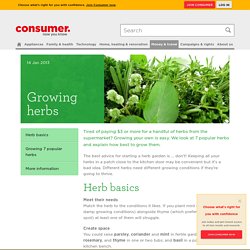
Keeping all your herbs in a patch close to the kitchen door may be convenient but it's a bad idea. Different herbs need different growing conditions if they're going to thrive. Herb basics Meet their needs Match the herb to the conditions it likes. If you plant mint (which thrives in damp growing conditions) alongside thyme (which prefers a dry sunny spot) at least one of them will struggle. Create space You could raise parsley, coriander and mint in fertile garden soil; oregano, rosemary, and thyme in one or two tubs; and basil in a pot on your kitchen bench. How To Build A Raised Vege Garden - Mitre 10. If you want to grow the biggest, healthiest, fastest-growing veges, build yourself a raised vege garden.

Because everything’s contained you can fill your raised garden up with all the very best soil, compost, mulch, and fertiliser. Then, just plant your veges and stand back. Before You Start If you’re thinking about building a raised vege garden, the first step is deciding where it’s going to go. Veges like a nice balance. What Size Timber Once you know where the garden’s going, work out what size you’d like it to be. What Kind Of Timber There’s ongoing debate about what timber you should use to build a raised garden.
Site Preparation This is pretty simple. Macrocarpa Build 200 x 100mm On the Easy As Raised Garden Build video we went up a step from standard 200x50 planks and used big 200x100 macrocarpa planks. Get all four base planks into position and lined up, predrill your screw holes (including the countersinking for the hex heads of the coach screws) and screw together. Standard Build. A Beginner's Guide to Vegetable Gardening. Whether your dream vege patch is bursting with salad greens for summer barbeques, or carrots and leeks for hearty winter soups, nothing beats the satisfaction of ‘growing your own’.
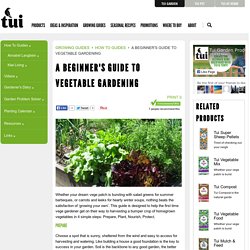
This guide is designed to help the first time vege gardener get on their way to harvesting a bumper crop of homegrown vegetables in 4 simple steps: Prepare, Plant, Nourish, Protect. Prepare Choose a spot that is sunny, sheltered from the wind and easy to access for harvesting and watering. Like building a house a good foundation is the key to success in your garden.
Soil is the backbone to any good garden, the better the soil, the more successful your garden will be. Plant. How to start a vege garden. Grow your own food company proves a winner. Last updated 05:00, April 5 2015 Christel Yardley/Fairfax NZ Innes 48 Hour Business Start Up competition winners Chris Morrison, left, Fiona Clarkson and Nick Pacey.
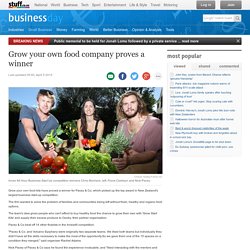
Grow your own food kits have proved a winner for Pacey & Co, which picked up the top award in New Zealand's largest business start-up competition. The firm wanted to solve the problem of families and communities being left without fresh, healthy and organic food options. The team's idea gives people who can't afford to buy healthy food the chance to grow their own with 'Grow Start Kits' and supply their excess produce to Oooby, their partner organisation. Pacey & Co beat off 14 other finalists in the Innes48 competition. "Pacey & Co. and Volcanic Epiphany were originally two separate teams. Nick Pacey of Pacey & Co says he found the experience invaluable, and "liked interacting with the mentors and being around so many likeminded people". The team's intention is to keep the momentum going and begin developing the business.
Food rescue. National Food Waste Prevention Project. The National Food Waste Prevention Project is an initiative of the WasteMINZ Behaviour Change Sector Group.
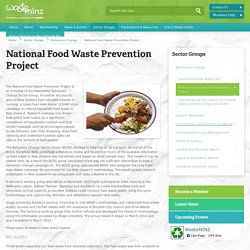
A number of councils around New Zealand had indicated interest in running a ‘Love Food Hate Waste’ (LFHW) style campaign to reduce household food waste in New Zealand. Research overseas has shown that edible food makes up a significant component of household’s rubbish and that simple messages such as encouraging people to use leftovers, plan their shopping, store food correctly and understand portion sizes can reduce the amount of food wasted. The Behaviour Change Sector Group (BCSG) decided to take this on as a project. On behalf of the BCSG, Sunshine Yates undertook a literature review and found that much of the available information on food waste in New Zealand was out-of-date and based on small sample sizes. This research can be viewed here. Three types of research tools were created: Bin audits: These audits separated out food waste from kerbside collections.
Online Survey: Food Tips - Sustainability - University of Canterbury - New Zealand. Food initiatives on campus Food is essential to all, yet here in New Zealand it is so often taken for granted.
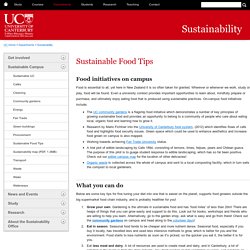
Wherever or whenever we work, study or play, food will be found. Even a university context provides important opportunities to learn about, mindfully prepare or purchase, and ultimately enjoy eating food that is produced using sustainable practices. On-campus food initiatives include; Restoring New Zealand's Food System - Sustainable Business Network. Here at the Sustainable Business Network we’re trying to help find solutions to the challenges in the food system, from production, manufacturing, distribution, access and eating through to waste.
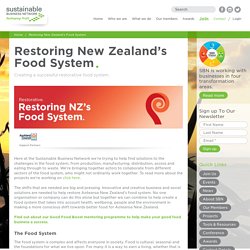
We’re bringing together actors to collaborate from different sectors of the food system, who might not ordinarily work together. To read more about the projects we're working on click here. The shifts that are needed are big and pressing. Cultivating health. Down to earth: Community gardens around the city. Community gardens are a growing trend in Auckland, a place to learn how to reap what you sow in every sense, writes Kirsten Warner.
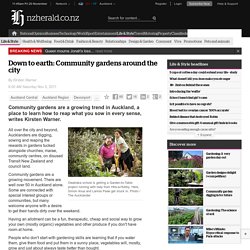
All over the city and beyond, Aucklanders are digging, sowing and reaping the rewards in gardens tucked alongside churches, marae, community centres, on disused Transit New Zealand and council land. Community gardens are a growing movement. There are well over 50 in Auckland alone. Some are connected with special interest groups or communities, but many welcome anyone with a desire to get their hands dirty over the weekend.